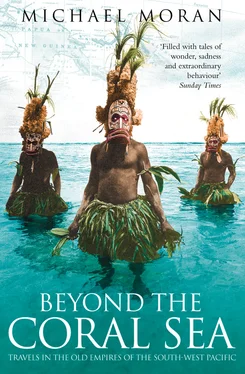Despite his scientific training he had a creative temperament, beset by the demons of sensual temptation and metaphysical alienation:
… I have got the tendency to morbid exaggeration … There is a craving in me for the abnormal, the sensational, the queer …
In his diary he wrote descriptions of the Samarai landscape that possess the intensity and heightened feelings of German Expressionist painting:
The evening before: the poisonous verdigris of Sariba lies in the sea, the colours of blazing or phosphorescent magenta with here and there pools of cold blue reflecting pink clouds and the electric green or Saxe-blue sky … the hills shimmering with deep purples and intense cobalt of copper ore … clouds blazing with intense oranges, ochres and pinks.
He wrestled with language and culture like his compatriot and friend Joseph Conrad, a similarly-displaced Pole. Some commentators spoke of him, rather inaccurately, as the Conrad of anthropology. This he never was, possessing more of the Nabokovian ‘precision of poetry and intuition of science’, qualities the great enchanter impressed on his literature students at Cornell. But the prose of the diary, written partly in the Trobriand Islands, does share similar unsettling qualities to those we find in Conrad’s tale Heart of Darkness set in the Congo. Both writers pressure language to its limits. Malinowski was seeking a cultural truth, the resolution of an identity crisis.
‘Bronio’ felt that islands symbolised the imprisonment of existence, yet, ‘At Samarai I felt at home, en pays de connaissance [in the world of knowledge],’ he writes. His fastidious nature was repelled by what he considered the inhospitable, drunken and wretched representatives of European humanity he found on Samarai, how they contrasted so depressingly with the natural beauty surrounding him. The ‘part-civilised’ local villagers he found there offended him equally. He would compulsively circle the island on this path like a caged panther. He sometimes felt he was merely exchanging the prison of self for the prison of cultural research. Yet Malinowski redefined the role of the ethnologist, his work expressing a romantic love for non-European cultures. Here was a man driven to seek his own philosophical nirvana. He subjected his own psyche to as close an objective scrutiny as the Trobriand villagers he studied. One of the great journeys of the modern European mind began on this tiny island of Samarai in 1914.
Campbell’s Walk continued along the tropic shore, past rocks defaced by graffiti at the most easterly point but giving way to views of enigmatic Logea island shaped like an oriental hat, and chains of islets married to the sea by golden rings of sand. Clumps of hibiscus with miniature flowers suspended like drops of blood grew abundantly. Arching over the water, a strangely-shaped frangipani tree emerged from a wall, branches loaded with yellow and cream blossom, a canoe silently passing beneath. Almost hidden among the palms were the police station and the modest hospital, a moloch for patients in the early colonial days.
The heat was monstrous. I envied the village boys swimming among the tropical fish in the crystal water. I leant on a broken rail at the end of the wharf.
‘Those two are my sons,’ a voice behind me said.
I turned to see a tall, elderly ‘whiteskin’ in a baseball cap. The ubiquitous shorts and plasters decorated his legs, flip-flops on leathery feet, but it was the fathomless melancholy in his eyes that struck me. They were the bloodshot eyes of a hounded man given over to alcohol and grief. The lower lids drooped to catch his many tears.
‘Oh! They seem pretty happy. Wish I was a bit younger.’ I smiled pleasantly.
‘Well, I buried my wife a few days ago in the Trobriands. On Kitava. Died of cancer.’
‘I’m terribly sorry.’
‘We took her by boat. That’s mine over there. The Ladua. She was built on Rossel Island in the Louisiades.’ I glanced over at an attractive, wooden trade boat painted ochre and grey.
‘Why didn’t you bury her here on Samarai?’
‘I can see you haven’t been here long! Her soul must go to Tuma, the erotic paradise in the Trobriands where departed spirits dwell. It’s a pláce where you stay beautiful and there’s no old age. You might call it Heaven. You can hear the spirits crying there at night. It’s the mirror of the world.’ People so rarely speak in this way I lapsed into silence for a time, turning over these poetic images.
‘Is sorcery still strong?’
‘It absolutely rules the lives of everyone living on Samarai, particularly the women! Everything is explained by sorcery, particularly losses at sea – people taken by sharks or crocodiles. Dinghies often sink in the savage currents. We lost six drowned over there a few weeks ago, and four over here the other day. They try to take the boats as far as Port Moresby!’
I reflected grimly that all my travels through these infested waters would be without a life jacket or radio.
‘There’s a launch pad for yoyova just along the path. Did you see it?’
‘No. What are yoyova ? Strange word.’
‘They’re the flying witches. They spread destruction and flame from their … well, you know! They can change shape into birds or flying-foxes, even appear like a falling star or fire-fly.’
‘But they aren’t real, surely. What’s this launch pad look like?’
‘A frangipani tree sticks out from the wall over the sea. It’s an odd shape. You can’t miss it.’
‘Yes! I did see it.’
‘They represent the malevolent magic of women, my boy. You must’ve experienced that. They’re real women all right. Some have sex with tauva’u , those malicious beings who bring epidemics.’
‘Yes, but what do they do exactly? How do they catch you?’
‘They pounce from a high place and rip out your entrails, eyes and tongue. They snap your bones then they devour the rest of your corpse.’
Those inflamed, leaden eyes might well have witnessed such ghoulish instincts in action.
‘When does this happen?’
‘Usually when there’s a storm. If you smell shit when you’re fishing out at sea, watch out! Then the flying witches will attack by the squadron! They stink!’ he laughed out loud, but without conviction.
‘They’re objects of real terror to these people. It’s no joke because their powers are inherited, carried in their belly. Sometimes the spirit leaves them when they’re asleep and goes marauding.’
I tried to imagine a world where such beings were an everyday part of consciousness. The books of J. R. R. Tolkien approached such a phantasmagoria, but his cruelty was of a different order.
‘Sorcerers don’t have the power they did in the old days!’ and he looked dreamily out to sea.
The boys had begun diving for pebbles and shells.
‘Have you lived here long?’
‘Only about sixty years. I came here when I was five.’
‘Sixty years on tiny Samarai! I think I would have gone mad.’
‘Well, I did. I live over there now. On Ebuma.’
He pointed to a perfect tropical islet surrounded by glittering sand lying a couple of miles offshore.
‘It belongs to the Prime Minister. I’m just the caretaker. My name’s Ernie, by the way.’
I introduced myself … ‘Ebuma looks like everybody’s dream island.’
‘Why don’t you come over for a few weeks? We could talk. I could show you the fishing rats. They come down to the shore at night and dangle their tails in the water as bait. Small crabs catch hold and they whip it quickly round to their mouth and fasten onto the crab. Munch, munch!’
‘You’re having me on, Ernie!’
‘There are strange things around here all right. If you see a swordfish leaping out of the water and going crazy, they have a borer in the brain.’
Читать дальше












